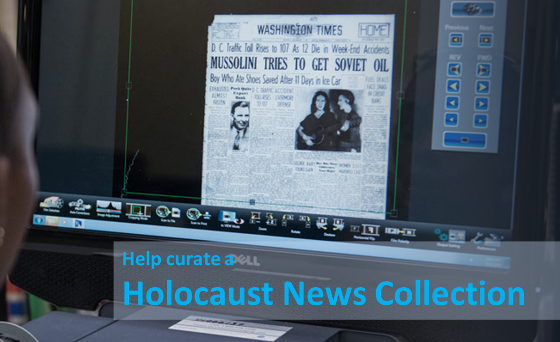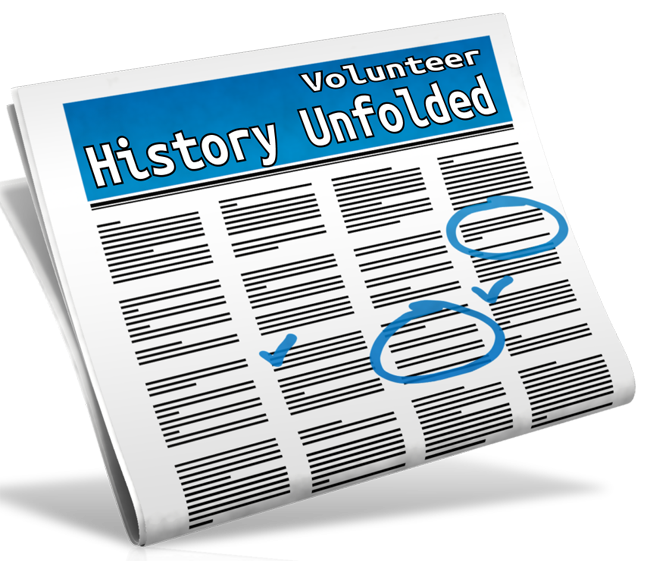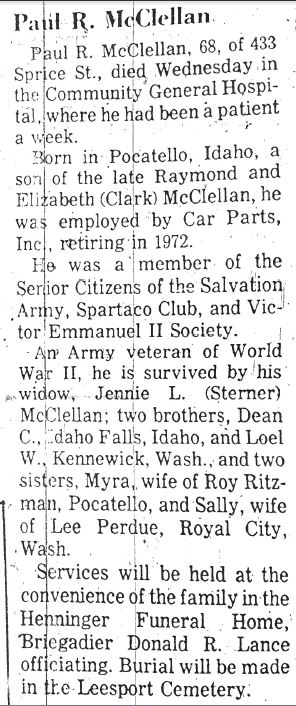by Lisa Cooke | Jun 24, 2017 | 01 What's New, Jewish, Newspaper, Volunteer
Looking for an easy way to make a big difference? Help collect Holocaust newspaper articles printed in your local newspapers for the History Unfolded project of the United States Holocaust Memorial Museum. Do it on your own, or with your local genealogical or historical society!

The following article came to us via Newspapers.com:
What is History Unfolded? History Unfolded is a project that seeks to expand our knowledge of how American newspapers reported on Nazi persecution during the 1930s and ’40s so we can better understand what Americans knew about the Holocaust as it was happening.
To help achieve this, the History Unfolded project asks people like you to search local newspapers from the 1930s and ’40s for Holocaust-related news and opinions and then submit them online to the museum. The newspaper articles you submit will be used to help shape the museum’s 2018 exhibit on Americans and the Holocaust and related educational materials. The articles will also be made available to scholars, historians, and the public.
Who Can Contribute? Everyone! History buffs, students, teachers (with) an interest in the Holocaust and access to a newspaper from the 1930s or ’40s, either online (using Newspapers.com, for example) or through a physical archive, such as a library. Simply create an account with History Unfolded (to get started.)
How Do I Contribute? History Unfolded has created a list of more than 30 Holocaust-related events to focus on. Choose one of these events to research, then search for content related to that topic in an American newspaper of your choice from the 1930s or ’40s. After you find an article related to one of the events, submit it online to the museum through the project’s website.
 Newspapers.com and History Unfolded You can contribute to this important project whether or not you use Newspapers.com to do so. But using Newspapers.com makes it even easier to submit the articles you find. Simply use Newspapers.com to create a clipping of an article you’ve found, then submit that clipping through the submission form on the History Unfolded website. The submission form has a special tool created specifically for Newspapers.com users that makes submitting your clipping a snap.
Newspapers.com and History Unfolded You can contribute to this important project whether or not you use Newspapers.com to do so. But using Newspapers.com makes it even easier to submit the articles you find. Simply use Newspapers.com to create a clipping of an article you’ve found, then submit that clipping through the submission form on the History Unfolded website. The submission form has a special tool created specifically for Newspapers.com users that makes submitting your clipping a snap.
Your help with this project will help shape our understanding of the Holocaust and the lessons it holds for us today. For more information on how to get involved, visit the History Unfolded website.
Get involved! Click here to read about more ways to volunteer in our global genealogy community. Your efforts make a huge difference.
by Lisa Cooke | Apr 29, 2015 | 01 What's New, images, Listeners & Readers, Newspaper, Records & databases, Technology, United States, Volunteer
 Recently we received this inspiring story from Brian Zalewski, a longtime Genealogy Gems podcast listener. He found a valuable genealogy resource and made it easier for others to access. Thank you, Brian!
Recently we received this inspiring story from Brian Zalewski, a longtime Genealogy Gems podcast listener. He found a valuable genealogy resource and made it easier for others to access. Thank you, Brian!
“Over the years I’ve spent a lot of time looking for death listings in the archive of The Milwaukee Journal on Google News. These entries are usually so small (or too bad of quality) that they don’t get picked up by the character-recognition software….This means you can’t search for [ancestors’ names in them via OCR]. Also, depending on the date of the paper, the death may be recorded in a normal obituary, a full article (like my great-great grandfather, fortunately), a tiny single-line burial permit, or a small death notice.
“I decided to start recording all of the deaths I can find. I try to note the date, individual’s name, paper, type of record, age, and address. So far, I’ve recorded over 1000 entries (some duplicates due to similar entries on multiple days), mainly from the years of 1884, 1885 and 1910.
“The benefit of doing this is two-fold. This data will be recorded and searchable for everyone, and I will probably find information on my family somewhere. Also, who knows how long Google will keep the archives online. These papers are available elsewhere on microfilm, etc, but I’ll do what I can when I can.
“I have also spent some time adding a few helpful features. Within the details of a death entry, you can automatically search for the individual in a few burial index sites. Currently, this includes the Archdiocese of Milwaukee Catholic Cemeteries burial index, Find-A-Grave, and BillionGraves. The search, while helpful, is not perfect. I can only search using the information included in the entry. Sometimes this does not work if the name is spelled differently in both places, though you can always tweak the search variables once you’re at the indexing site. If I happened to find a matching entry from one of those sites, that URL is now linked directly from the entry. The entry will also be flagged with the little headstone icon.
“Currently, it’s not a massive database, but it’s constantly growing. Hopefully it will be helpful to somebody with research in the Milwaukee, Wisconsin area.” Click here to search his database of Milwaukee Journal obituaries.
Want to learn more about searching for obituaries in newspapers? Click to read the blog posts below:
by Lisa Cooke | Feb 26, 2015 | 01 What's New, Beginner, images, Newspaper, Records & databases, United States
 Do you have obituaries for all your relatives who have died in the past 40 years or so? You should.
Do you have obituaries for all your relatives who have died in the past 40 years or so? You should.
Obituaries–even the most recent ones–can jump-start your research on a new family line or tackle a branch that doesn’t seem to be going anywhere.
Why? Our “collateral kin” (cousins, aunts and uncles) often lived near, intermarried with and otherwise had contact with other relatives we really want to find.
That’s where recent obituaries come in. The lists of names they contain help us identify relatives (and their spouses) we may not even have known about. Places mentioned can lead us to more records, as can clues about jobs, church affiliation and where someone went to school.
FamilySearch and GenealogyBank are indexing millions of recent obituaries from GenealogyBank’s extensive newspaper collection. Search the free index, with ongoing updates (24.4 million names recently added) at United States, GenealogyBank Obituaries, 1980-2014. Search by name or browse by state and then by the name of the newspaper. Check back often!
 Click here to read a post about how valuable an obituary was in helping me learn more about my long-lost great uncle Paul McClellan.
Click here to read a post about how valuable an obituary was in helping me learn more about my long-lost great uncle Paul McClellan.
Learn more about newspaper research (including how to find obituaries) in Lisa’s book How to Find Your Family History in Newspapers. There’s an entire chapter on online digitized newspaper collections, and one on online resources for finding newspapers (either online or offline). Yet another chapter is devoted to African American newspapers. This book will teach you to find all those elusive obituaries–and plenty more mentions of your family in old newspapers.
by | Jul 24, 2014 | 01 What's New, Beginner, Newspaper
 Recently I decided to learn more about my great-uncle Paul McClellan, my grandfather’s brother. After World War II, Paul left his Idaho hometown for Pennsylvania. Surviving relatives know hardly anything of his life or family.
Recently I decided to learn more about my great-uncle Paul McClellan, my grandfather’s brother. After World War II, Paul left his Idaho hometown for Pennsylvania. Surviving relatives know hardly anything of his life or family.
The census only takes me through 1940 and he lived through the 1970s. Pennsylvania vital records are pretty tight-lipped. So almost immediately, I found myself looking for obituaries.
Our online community tree at FamilySearch told me when and where he died. I emailed the local history and genealogy contact at the public library in that town. I heard back within a day and had this obituary within a week.
I’ve seen a lot of detailed obituaries. But perhaps because I’m so thirsty for information on Paul, the level of detail in this obituary made me especially happy. I see his:
- Age
- Street address
- Hospital where he died and length of stay there
- Birthplace and age
- Parents’ names, including mother’s maiden name
- Employer and retirement date
- Membership in local civic organizations
- WWII Army veteran status
- Surviving widow’s name, including maiden name
- Names, spouses and residences of surviving siblings
- Name of funeral home and officiator of funeral
- Cemetery name
Wow! Some of these details confirmed that I had the right guy: his age, birth data, relatives’ names. Others open new avenues of research for me. I’ve already started following leads to the civic organizations, funeral home and cemetery.
You know, what is NOT said in this obituary may also prove important as I continue my research on Paul. First, there are no surviving children or grandchildren listed. This disappoints me as I was told he did have children by at least one previous marriage. If he did have children, the informant (his widow?) either didn’t know about them or didn’t choose to mention them. Second, the informant did know a lot about Paul’s kin. Maybe Paul and his wife didn’t totally lose touch with the folks back home–it just seems so years later.
 Have you worked much with obituaries? Do you know how to find them? Learn more in Lisa’s book How to Find Your Family History in Newspapers, available in print or as an e-book. There’s an entire chapter on online digitized newspaper collections, and one on online resources for finding newspapers (either online or offline). Yet another chapter is devoted to African American newspapers. This book will teach you to find all those elusive obituaries–and plenty more mentions of your family in old newspapers.
Have you worked much with obituaries? Do you know how to find them? Learn more in Lisa’s book How to Find Your Family History in Newspapers, available in print or as an e-book. There’s an entire chapter on online digitized newspaper collections, and one on online resources for finding newspapers (either online or offline). Yet another chapter is devoted to African American newspapers. This book will teach you to find all those elusive obituaries–and plenty more mentions of your family in old newspapers.

 Newspapers.com and History Unfolded You can contribute to this important project whether or not you use Newspapers.com to do so. But using Newspapers.com makes it even easier to submit the articles you find. Simply use Newspapers.com to create a clipping of an article you’ve found, then submit that clipping through the submission form on the History Unfolded website. The submission form has a special tool created specifically for Newspapers.com users that makes submitting your clipping a snap.
Newspapers.com and History Unfolded You can contribute to this important project whether or not you use Newspapers.com to do so. But using Newspapers.com makes it even easier to submit the articles you find. Simply use Newspapers.com to create a clipping of an article you’ve found, then submit that clipping through the submission form on the History Unfolded website. The submission form has a special tool created specifically for Newspapers.com users that makes submitting your clipping a snap.








